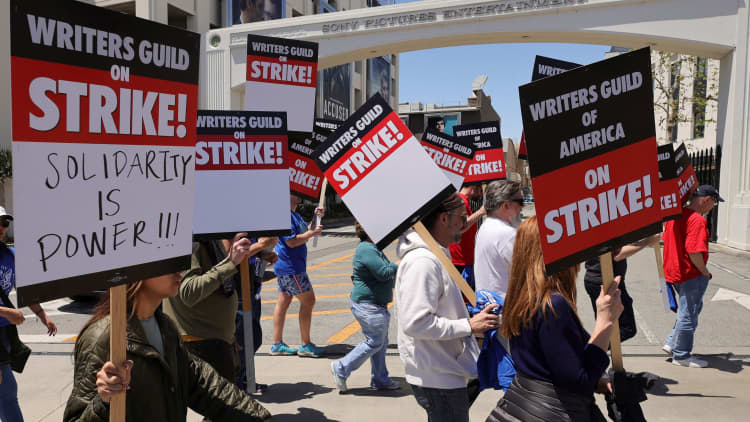The entertainment industry is currently witnessing a contentious period as over 11,000 film and television writers remain on strike due to unresolved contract negotiations with the studio association. Among the various issues being discussed in this year’s Writers Guild of America contract talks, one particular topic has ignited a heated debate: artificial intelligence (AI). With the emergence of generative AI technology, there is growing concern about its potential impact on the entertainment industry and the livelihoods of industry professionals.
Proponents of AI technology argue that it has the potential to revolutionize content creation and democratize access to the industry. Advocates envision a future where consumers can simply input a prompt and instantly receive engaging content, regardless of their technical skills or background in the entertainment industry. AI filmmaker Caleb Ward believes this accessibility will empower content creators and eliminate entry barriers.
The rapid adoption of video streaming platforms since the 2007 writers’ strike has demonstrated how new technologies can disrupt the entertainment industry. However, the leaders in the streaming space are grappling with the soaring costs associated with producing high-quality content at scale. While Netflix remains profitable, other major players like Disney and Warner Bros. Discovery are experiencing substantial financial losses each year.
As streaming companies struggle to maintain profitability, they are resorting to removing content from their platforms, which directly impacts the compensation of content creators. Deals made with streaming platforms or distributors have a direct influence on the royalties received by distributors, producers, writers, and actors. As a result, the income and livelihoods of those involved in the creation process are affected.
The looming integration of AI technology poses a significant challenge for the Writers Guild of America. The guild is demanding regulatory standards that ensure fair labor conditions and proper compensation for Hollywood professionals in the face of AI’s potential to disrupt traditional content creation processes. The guild recognizes the need to protect the rights and interests of writers, actors, directors, and other industry professionals as the entertainment landscape evolves.
The current writers’ strike highlights the anxieties surrounding the increasing influence of artificial intelligence on the entertainment industry. While some see AI as a transformative tool that can empower content creators and lower barriers to entry, there are concerns about its potential to undermine labor standards and displace industry professionals. Balancing the adoption of AI with fair compensation and appropriate regulation will be crucial in shaping the future of the entertainment industry, ensuring that technological advancements are harnessed responsibly while safeguarding the rights of those who bring stories to life.





